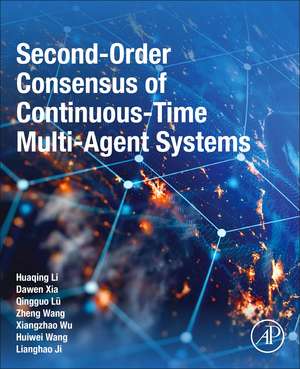Second-Order Consensus of Continuous-Time Multi-Agent Systems
Autor Huaqing Li, Dawen Xia, Qingguo Lu, Zheng Wang, Xiangzhao Wu, Huiwei Wang, Lianghao Jien Limba Engleză Paperback – 21 feb 2021
On this basis, the book provides an in-depth study of intrinsic nonlinear dynamics from agents’ perspective, coverage of unbalanced directed topology, random switching topology, event-triggered communication, and random link failure, from a communication networks’ perspective, as well as leader-following control, finite-time control, and global consensus control, from a protocols/algorithms’ perspective. Finally, simulation results including practical application examples are presented to illustrate the effectiveness and the practicability of the control protocols and algorithms proposed in this book.
- Introduces the latest and most advanced protocols and algorithms in second-order consensus of continuous time, multi-agent systems with various characteristics
- Provides readers with in-depth methods on how to construct the frameworks of stability analysis, algebraic criteria, and performance evaluation, thus helping users develop novel consensus control methods
- Includes systematic introductions and detailed implementations on how control protocols and algorithms solve problems in real world, second-order, multi-agent systems, including solutions for engineers in related fields
Preț: 834.37 lei
Preț vechi: 1049.40 lei
-20% Nou
Puncte Express: 1252
Preț estimativ în valută:
159.65€ • 166.69$ • 132.14£
159.65€ • 166.69$ • 132.14£
Carte tipărită la comandă
Livrare economică 28 martie-11 aprilie
Preluare comenzi: 021 569.72.76
Specificații
ISBN-13: 9780323901314
ISBN-10: 032390131X
Pagini: 194
Dimensiuni: 191 x 235 x 19 mm
Greutate: 0.35 kg
Editura: ELSEVIER SCIENCE
ISBN-10: 032390131X
Pagini: 194
Dimensiuni: 191 x 235 x 19 mm
Greutate: 0.35 kg
Editura: ELSEVIER SCIENCE
Public țintă
Primary: Academics (scientists, researchers, MSc. PhD. students) from the fields of Mathematics, Computer Science, automation, Applied Mathematics, Artificial Intelligence, and Information Technology. The audience includes researchers and practitioners in any field that deals with systems sciences – modelling of complex systems, intelligent systems, multi-agent systems, and intelligent information processingSecondary: Academics, researchers, and industries working in the fields of engineering, medicine, and natural sciences
Cuprins
1. Second-Order Consensus Seeking in Directed Networks of Multi-Agent Dynamical Systems via Generalized Linear Local Interaction Protocols2. Robust Finite-Time Leader-Following Consensus Algorithms for Second-Order Multi-Agent Systems with Nonlinear Dynamics3. Second-Order Consensus of Multi-Agent Systems with Nonlinear Dynamics over Random Switching Directed Networks4. Second-Order Locally Dynamical Consensus of Multi-Agent Systems with Arbitrarily Fast Switching Directed Topologies5. Second-Order Global Consensus in Multi-Agent Systems with Random Directional Link Failure6. Algebraic Criteria for Second-Order Global Consensus in Multi-Agent Networks with Intrinsic Nonlinear Dynamics and Directed Topologies7. Event-Triggering Sampling Based Leader-Following Consensus in Second-Order Multi-Agent Systems8. Consensus Analysis of Multi-Agent Systems with Second-Order Nonlinear Dynamics and General Directed Topology: An Event-Triggered Scheme
